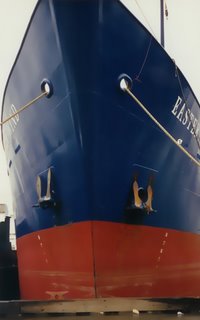"Property and Fisheries for the 21st Century"---a scientific paper

The rest of the title of this 39 page paper is: Seeking Coherence from Legal and Economic Doctrine.
As the few remaining shore based companies control more of these kind of boats to harvest their "private stocks," they use their pushing power to seek even more "private stocks."
The authors are Seth Macinko, Assistant Professor in the Department of Marine Affairs, University of Rhode Island, and Daniel W. Bromley, Anderson-Bascom Professor of Applied Economics, University of Wisconsin, Madison.
Too bad we can't publicly examine that paper by that Darth Vader of economists that was used by the "Processors Council" to gain title to the pollock and crab. His University received truck loads of money from big companies privately seeking the fish resources for themselves. Alaska state government knew this too, but wouldn't tell the commercial fishing public.
I'm just going to copy the first page of this 39 page paper, and provide a hyper-link to the rest of the paper on PDF so you can print it out. Put it in the magazine rack in the head until you're done with it. Unfortunately the saying will probably be true, "The more the information, the narrower the audience." If nothing else, make sure those high-flying representatives of ours in Congress puts this in the mix in the MSA reauthorization debates. And go the the June NPFMC meeting and read your three minute speech to counter all the lies that are forming fisheries policy.
INTRODUCTION
This paper provides an opportunity to offer what the Hollywood crowd might call a prequel--an account of logical antecedents that contributes to fuller understanding. Recently, we have challenged the reigning orthodoxy in fisheries policy by rejecting the twin notions that fisheries management in the United States is afflicted by a property rights problem, and that the solution to current woes is to be found in the creation of private property rights. The purpose in this paper is to extend our previous argument by examining antecedents we were not able to fully explore in our earlier work. We then extend our overall argument by emphasizing how new possibilities for fisheries policy have been precluded by old understandings. A bit of background will help set the stage for readers who are unfamiliar with debates over fisheries policy.
Emphasis on "rights-based fishing" is ubiquitous in contemporary discussions of fisheries and ocean policy. We argue that the rights-based fishing movement is hegemonic(dominant) and conceptually flawed. The conceptual flaws are both legal and economic in nature and result in a severe constriction of apparent policy options. Anyone interested in fisheries resources is essentially offered a stark policy prescription for the future: privatize or perish.
"Privatization" as such is not usually the key term employed. Instead, policy discussions are dominated by phrases such as "rationalization," "IFQs" (individual fishing quotas) and, of course, the aforementioned rights-based fishing. But closer inspection reveals a clear, systematic emphasis on the introduction of private property rights as the necessary condition for salvation from the world's fishery problems. Even those who follow fishery policy only sporadically should be particularly clear on this point; prevailing policy prescriptions for the future rest squarely on calls to introduce private property rights into ocean fisheries. Moreover, the policy prescriptions emanating from the rights-based fishing movement suggest that these developments are just temporary waypoints on the path to privatization of "what really counts," the marine ecosystem itself.
It's going to be daunting to plow through this report, but if you can bait hooks all day, you can read this and do something about it. www.alaskareport.com/VLR_Macinko.pdf. The alternative is to let NOAA plaster no-trespassing signs all over the North Pacific with Rising Suns and Trident logos on them, like they did in the Bering Sea. If you don't believe me, call Bob at Aleutians East Borough at (907) 274-7555.
Another good resource is "Salmon Wars" by Dennis Brown and is available from www.Captainsnautical.com. Dennis tells me he was up to his eyebrows in fisheries politics in British Columbia. Canada started seeing the decline of the "fishing community" of boats and towns long before it started in Alaska.


<< Home